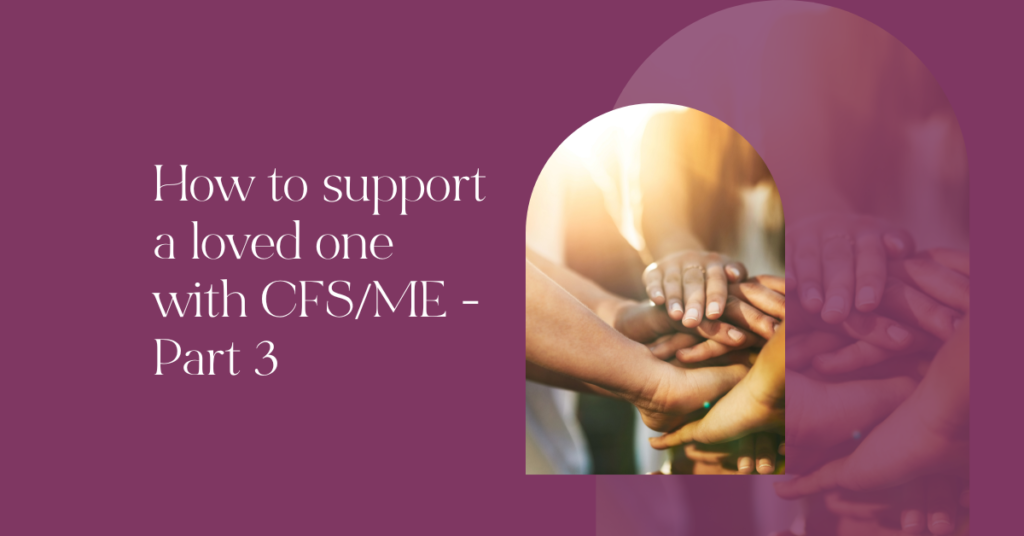This is part 3 of a series on how to support a loved one with a chronic illness such as CFS/ME. The intentions are specifically to:
- Help the loved ones of those experiencing a chronic illness understand how they can be more supportive.
- Help those who are experiencing a chronic illness to communicate their needs better and allow themselves to receive more help and support in the ways that are meaningful to them.
You can read part 1 here and part 2 here. I suggest reading all parts in order so if you’ve just arrived here. Head back to part 1 and start there.
Communication
Healthy relationships are built on communication. Communication when it comes for support relies on two things:
- The ability to ask for what you need.
- Communicate when your needs aren’t being met and give feedback about what could work better.
- Making your request(s) in a way that it can be heard and honoured
This applies to both the Supporter and the Supported / Illness Experiencer. Both have needs and both will need to communicate their needs as they navigate the collective Chronic Illness experience.
I have worked with countless clients who have felt a lack of support from their relationships but when questioned, haven’t specifically and clearly communicated what they need.
I have also worked with countless clients who are asking for what they need specifically and often it can feel like these requests are falling on deaf ears which can be particularly frustrating.
As we look deeper into communication we want to consider the following:
You cannot expect someone to read your mind. People have different ideas about how things should be done, what is okay versus not okay and what support looks like. If you are not receiving support in the way you would like, reflect on whether or not you have specifically and clearly stated your needs.
You teach people how to treat you. This means that you must first be clear on the boundaries of how you would like to be treated, or in this case supported. You must also be able to vocalise and give feedback when your expectations have not been met.
Quick journaling exercise:
- How am I currently being supported in a way that is meaningful to me?
- Is support being offered in a way that is unhelpful or possibly counterproductive to my healing?
- What support am I not currently receiving that I would like to receive?
- What do I need to ask for specifically? Be as specific as possible.
- Here are some examples:
- I need you to cook dinner by 7pm on Tuesday and Thursdays evenings.
- I need you to read this blog by next week Friday so we can talk about it together on Saturday morning when the kids are at tennis.
- I would like it if you could ask me more questions about my healing journey. Perhaps once a week we can have a hot drink and chat about how I feel things are going.
- When I tell you I am having a bad day, I don’t need you to do anything for me except sit with me for a bit and listen.
Once is not enough. When you are conditioning a new behaviour (i.e. teaching someone how to treat/support you), repetition is key. You may need to repeat instructions, requests, reassert boundaries or revisit conversations. I know this can be frustrating when you are already tired and feeling unwell, it feels like another thing you have to work on. Unfortunately relationships take work and this work will pay off and save you energy in the future when the new behaviours have been created.
Very often when I chat with clients they will say: I have asked but they don’t listen OR they say yes but never follow through.
There is an NLP (neuro linguistic programming) saying which goes: the meaning of your communication is the response that you get.
In other words, if you are offering feedback, making a request or setting a boundary and it feels like it is falling on deaf ears, you’ll want to find a different way of communicating.
There is a specific process that I teach my clients so that they can do this but ultimately it comes down to the following:
- Acknowledge the problematic behaviour
- How it is having a negative impact on you
- Acknowledge the positive intent behind the problematic behaviour
- Make the request for what would be more helpful instead
- Ask for agreement / consent
Here is an example:
When I tell you I am having a bad day, you often jump in and try to fix the situation and find solutions. When you do this, I don’t get what I really need, which is to feel seen and understood, and I feel even more disconnected and alone. I know this is hard for you too and that you are trying your best to help. I would feel more supported and connected to you if you could just sit with me and listen to what I have to say without trying to change the situation. Are you willing to give this a go?
Another example:
When I tell you I am having a bad day, you often jump in and try to fix the situation and find solutions. This frustrates me because I feel that you don’t really understand what it’s like to have this experience and then I feel angry and disconnected. I know this is hard for you too and that you are trying your best to help. I would feel more supported and connected to you if you could read / watch / listen to “x resource” and perhaps we could have a conversation about how we can work together better as a couple. Would you be willing to do this for me?
Needs
The success of these conversations are determined by your ability to know what you need and ask for it specifically.
The challenge with a chronic illness such as CFS/ME is often that we have been disconnected from our needs for a very long time. This makes it hard for us to ask for what we need because we may not know ourselves.
(Side note: It can also be a very “human problem” to not know our needs and therefore this may also be the case for the loved one who is doing the supporting)
I always say that healing is a journey of reconnecting to our needs and honouring them.
How do we connect to our needs?
We connect to our bodies and our nervous system.
Our nervous system is constantly sending signals every day that tell us if we are moving towards or away from safety. Building a relationship with those signals will help you connect better with what supports you and what is dysregulating for you.
When you notice dysregulation in the body, a need may be going unmet and you have the opportunity to ask yourself; what do I need in this moment to move in the direction of regulation?
Some of these needs you may be able to meet on your own and some of these needs may be requests from your partner, friends and family.
The role of the Supporter (Partner, friend or family member) is to be a safe space for a request to be made. If the person with the Chronic Illness has a tendency towards self-reliance, asking for help or making a request can feel unsafe. Over time however, we can learn to feel more safe making requests with positive reinforcement and practise.
Here is a little tool to make sure this goes well for both parties.
The person making the request must ask: Are you available?
The request “Are you available” is NOT the same as asking; do you have some free time right now?
Rather it is a request for energetic availability.
It is asking: Are you present and regulated in this moment? (i.e. is this a good time for us to have a conversation that could be challenging for both of us).
The Supporter must then check in with their body and if they feel settled, regulated and available they can say yes.
If they notice some dysregulation and activation or it is just not a good time, they can say no and offer an alternative.
Example: I am having a bit of a tough day, let’s talk after dinner tonight once the kids are in bed? OR can you give me five minutes to ground a little and then we can chat?
Remember that this works both ways. This is not a Chronic Illness formula it is a human formula which means that roles can be reversed and the Supporters may also need to make requests of the Illness Experiencer.
Here is an example:
Supporter: Are you available?
Illness Experiencer checks in with his / her body and decides she has capacity for a conversation. Responds; yes, how can I help?
Supporter: I know you have been going through a crash at the moment and you keep telling me I am not doing enough to support you. I find it really hard because I want to help but I often feel so helpless. Your criticism makes me feel even more useless and then I wonder why I bother. I know you are struggling and that you don’t really think I am useless. What would help me help you is if you could be more patient with me and perhaps give me some positive feedback on the things that I am doing well.
Honouring Requests
As you may have gathered by now making a request is a big deal:
- You need to notice when a need is not being met.
- You need to work out what is required to meet that need (is it something you need to do for yourself or do you need to ask for help?)
- You have to overcome the discomfort of asking for help.
- You have to wait for a good moment to ask when both parties are regulated and energetically available.
- You have to communicate your needs in a way that your request can be heard.
- The other person has to receive your request without becoming defensive, blaming, shaming, etc.
Whether it is the Supporter or the Illness Experiencer making the request, appreciate how much it has taken to get to this point.
Therefore, if you agree to the request. Honour it. Follow through on your commitment so that the request maker doesn’t have to use even more energy to nag you.
Specific Needs
To help you out a little here is a list of needs that my instagram community shared with me.
Needs for Chronic Illness Experiencer
I need to be encouraged and given permission to rest.
I need my supporter to take an interest in my illness experience (i.e. read blogs, books, listen to podcasts or watch documentaries).
I need my boundaries to be respected.
I need to be invited to events, parties etc. even if I cannot make it (this helps me to feel connected and included).
I need you to stay in touch without the pressure to respond to text messages.
I need to know that you believe me.
I need you to take an interest in my healing journey; ask me about therapies, experiences and different approaches I am engaged with.
I need support from you financially.
I need you to come to my medical appointments with me.
I need you to advocate for me at appointments or with friends and family.
I need you to help with x,y,z (insert physical task) around the home – remember to be specific; i.e. I need you to cook a healthy dinner 3 times a week on a Monday, Wednesday and Friday.
I need you to ask permission before you give advice.
I need you to take care of yourself too.
I need you to do things you enjoy, even if I cannot join in.
Needs for Supporter
I need space and rest from supporting.
I need you to respect my boundaries.
I need you to be acknowledged when I get it right or when I do things that you find supportive.
I need you to understand that I have bad days too.
I need you to understand that I am healing too.
I need you to understand that I don’t always know what to do.
I need you to understand that I am doing my best.
Please feel free to add your needs in the comments section and I will get them updated into the blog 🙂
Stay Tuned
In the next part in the series we’ll look at expectations and how miscommunicated expectations can often be the source of dissapointment and feeling unsupported. You’ll learn a frame work to identify blind spots and make sure that your expectations are met more often.










